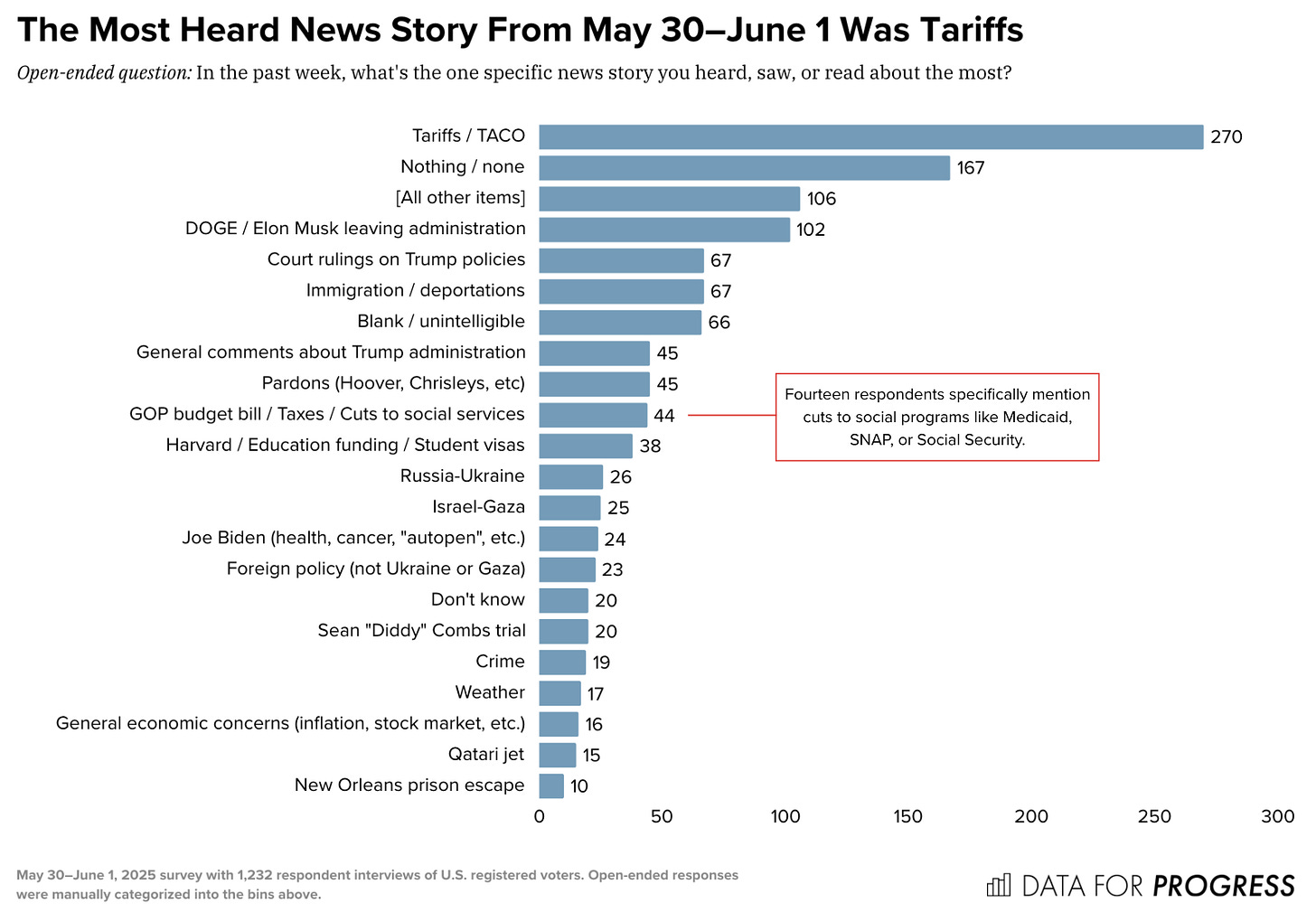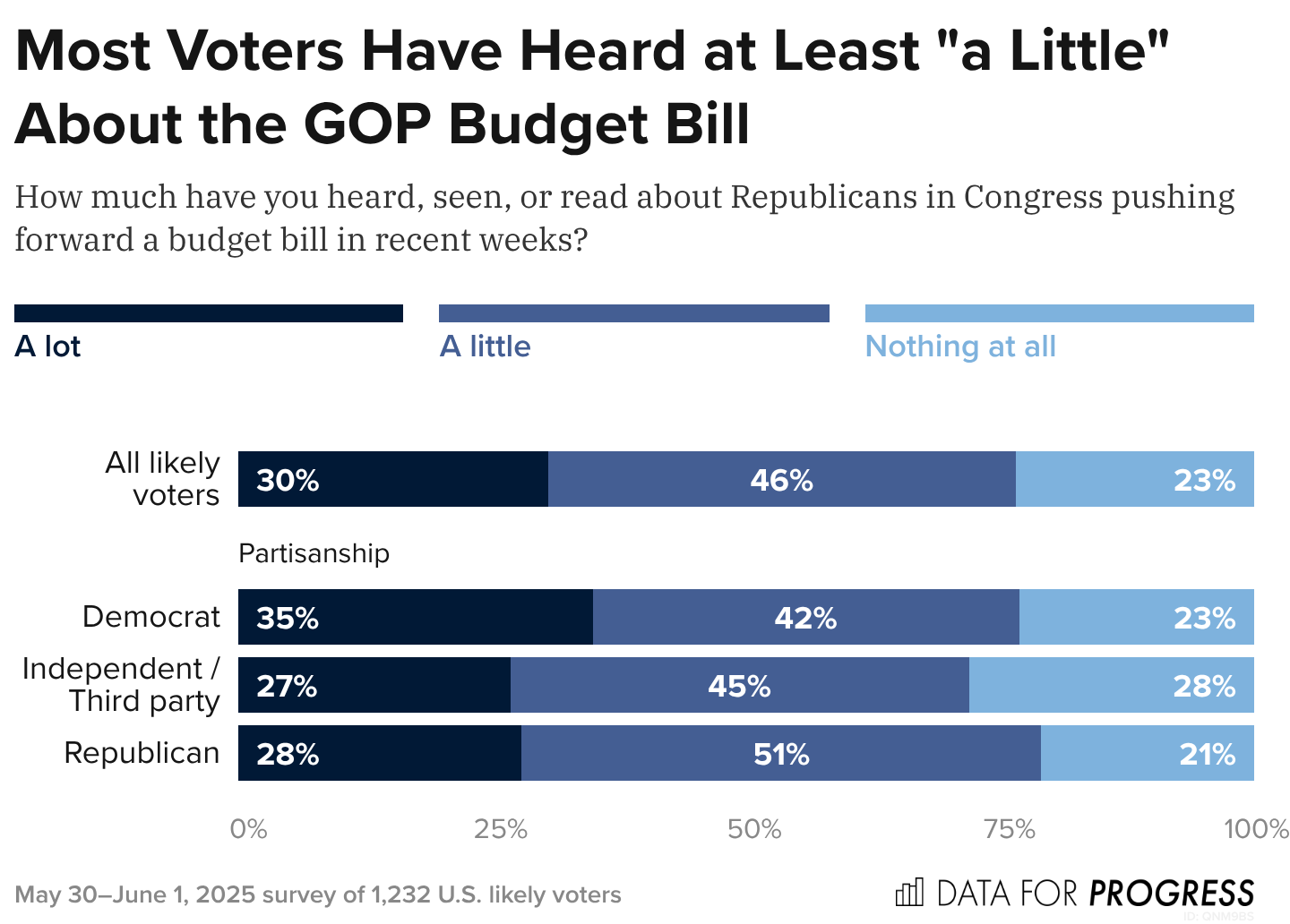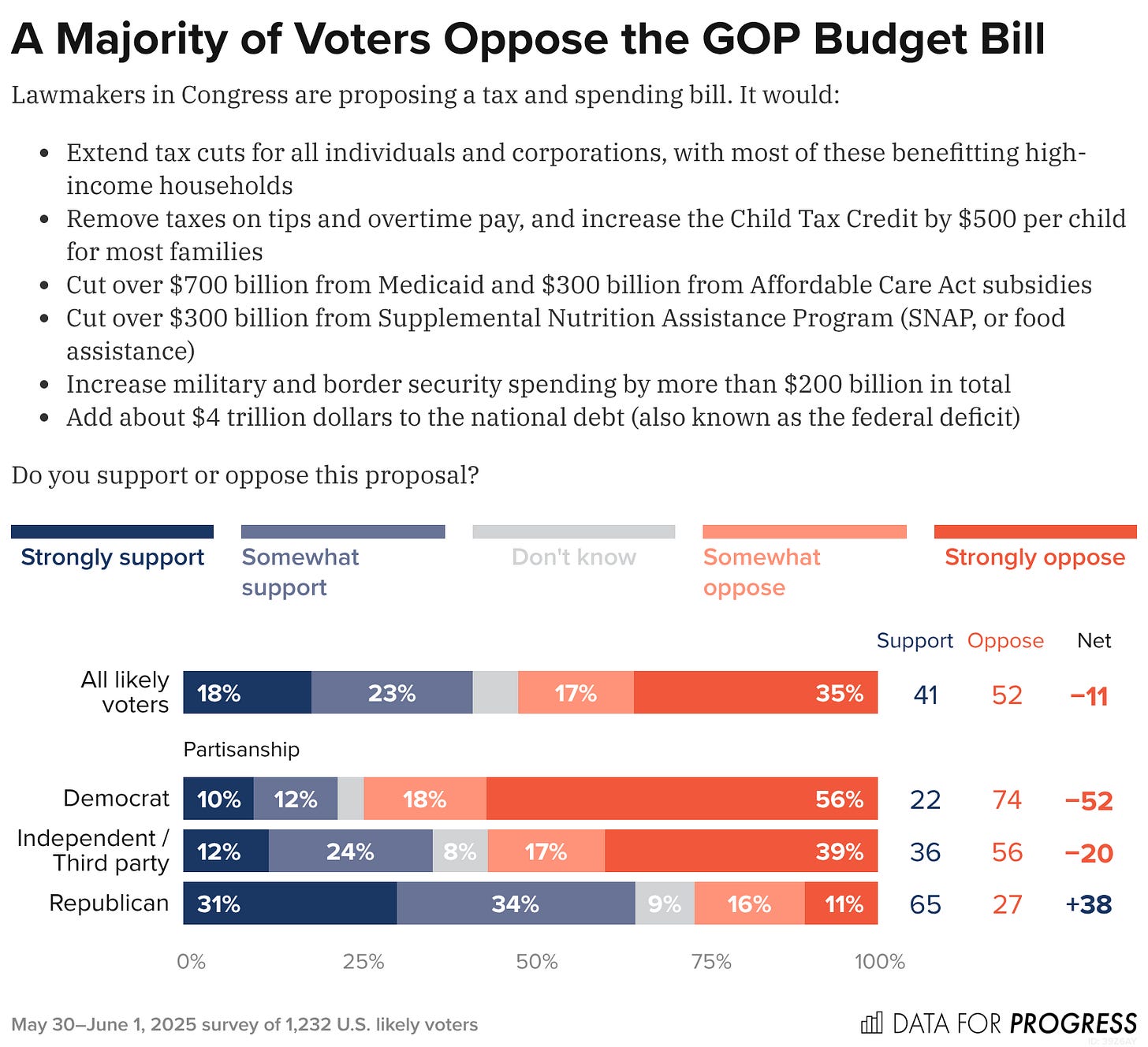Democracy and Climate Policy in the Dark
Most people have no idea what the GOP is about to do
This week, the Republican-led US Senate will try to release the first draft of a mega-bill that could dramatically reshape America over the next decade. If you know anything about this bill, you’re weird. That’s what a recent poll from Data for Progress found at least.
The pollsters first asked respondents, “In the past week, what's the one specific news story you heard, saw, or read about the most?” Just 44 out of the 1,232 respondents answered the GOP budget bill.
Ok, but that’s just the top story.
Surely, Americans are hearing a lot about this bill. After all, it will transfer trillions of dollars from poor Americans to wealthy Americans through tax breaks and cuts to programs like SNAP that feed hungry kids. It will kick millions of Americans off health insurance. It will gut clean energy subsidies. And it will do all that while boosting the national debt by $2.4 trillion.
Nope.
23% of Americans have heard “nothing at all” about the mega-bill. 46% have heard “a little” about it. Just 30% have heard “a lot.”
Given these numbers, it shouldn’t be surprising that most Americans don’t know much about the contents of the 1,000+ page legislation. Even House members that voted for the bill—some of whom now regret it—didn’t know what was in the bill.
In Data for Progress' poll, just 49% of respondents knew that the bill cuts billions in spending on nutrition assistance programs like SNAP (food stamps). 50% knew that it cuts hundreds of billions in clean energy and climate investments. 56% knew that it has deeply unpopular provisions cutting medicaid spending.
56% of respondents thought that the bill bans transgender military service members. It doesn’t do that.
So how do people feel once they learn what’s in this mega-bill? At the end of the survey, Data for Progress lays out—in pretty plain language—the actual contents of the bill and then asks if people support or oppose the bill.
52% opposed it, while just 41% supported it.
All of this echoes liberals’ and progressives’ larger problem: When Republicans pass unpopular laws, few see it; when Democrats pass popular laws still fewer see it.
Recently, the New York Times’ Lisa Friedman went to Cedartown, Georgia to ask locals what they thought of the huge clean energy investments that have flowed into the state in recent years. Since Democrats passed the Inflation Reduction Act, Georgia has attracted $24 billion in investment and created 32,000 jobs. The state is one of the great green industrial success stories of our time.
The theory of the IRA was that this kind of success would protect the law from any threat of repeal. Democrats learned in their failure to pass a climate bill in 2010 under Obama, that a climate bill couldn’t just have sticks—like a tax on pollution. It needed carrots that could put money in people’s pockets.
That theory hasn’t panned out though. Not in Cedartown, at least. Friedman writes:
In Cedartown, many people interviewed said they’d never heard of the Inflation Reduction Act and did not connect it to the Solarcycle factory. Some of those who had heard about the law described it as wasteful spending.
“They spent billions of dollars on the wind, and it didn’t work,” said Miller Green, 93, who had stopped in at the Polk County Historical Society Museum with his wife. She admonished him to stop talking about politics.
Voters in Cedartown are far from the exception. Poll after poll has found that most Americans have heard very little about the Inflation Reduction Act—or other big industrial bets Democrats made like the CHIPS Act.
Last Spring, pollsters at Yale found that just 39% of Americans had heard of the IRA. Another 22% had heard “a little” about it.
It’d be easy to dismiss all this as a problem of people not caring enough about climate change or the environment. Or you could argue that Americans are overworked and don’t have time, between their job and watching their kids, to tune into wonky policy debates.
But even young Americans studying environmental policy in California had barely heard of the IRA by last Spring—an election year, in which Democrats spent billions sending spam texts and running ads talking about their successes. As FastCompany’s Adele Peters recounted last year:
When Dustin Mulvaney teaches a class in environmental law at a California university, he always asks a simple question: Who’s heard of the Inflation Reduction Act? Over the last three years, he says, only around 10 students out of hundreds have raised their hands.
There are more theories on the IRA’s messaging failures than there are people in Cedartown, Georgia who have heard of the bill.
Some progressives have argued that the bill did too much for large corporations and too little for everyday Americans. Democrats must embrace “Green populism” going forward.
Others argue that most Democrats just suck at communications. Politicians need to take more plays out of Donald Trump’s playbook—or at least learn from the party’s more successful communicators like Alexandria Ocasio-Cortez.
I don’t know pretend to have the answer. But I feel confident that ambitious climate policy—and more importantly, durable climate policy—is only possible if a plurality of Americans support it. And in order to get that support, they have to know about these policies in the first place.





Michael, thanks for doubling down during these crucial days.
Clearly, "climate" is not getting much attention, even as part of discussions about the "budget bill." Not sure who to blame or credit. T2's 100 days have provided lots of "weapons of mass distraction." I'm kinda at a loss as to how to keep any momentum for actual "climate action." Lots more rattling around in my brain, but my dog is giving me the "step away from the keyboard and take me for a walk" look.